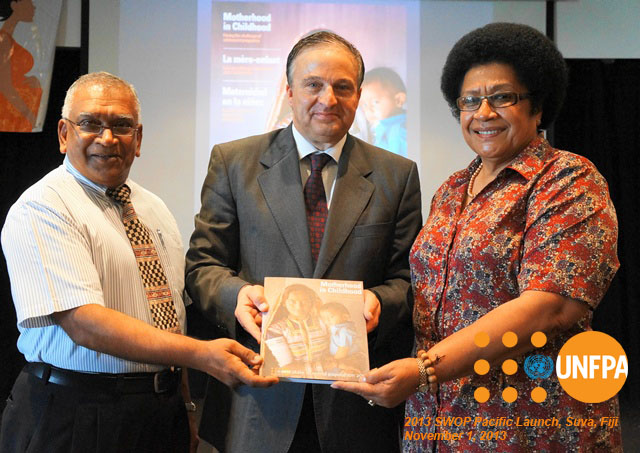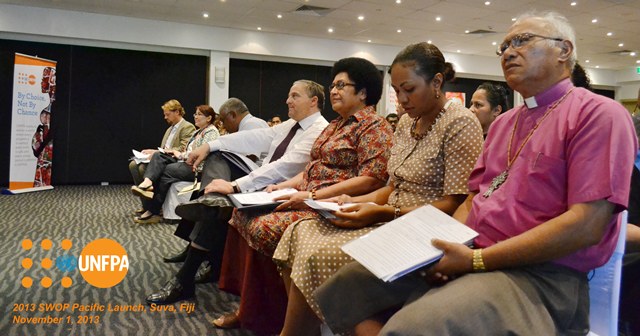ELENOA (not her real name) is now 30 years old, with three gorgeous children and on the verge of completing her studies for a Bachelor of Arts degree at the University of the South Pacific in Fiji.
Eleven years ago she was preparing for the transition between secondary school to university, complete with a government scholarship. It was also at this critical juncture of her life that she became pregnant. She lost her scholarship; the reaction from friends, family and family friends did not help.
"I was really depressed, I just wanted to kill myself," she said. "I told my boyfriend about it and I could not believe his reaction. I honestly thought that we were getting married but it was then that I found out I was just one of many girlfriends.

"I didn't know how to tell my parents, the one person I had depended on had let me down and I could not talk about it with anyone else because we are told when growing up that sex is bad and you don't want to be seen as bad. I felt all alone."
After giving birth, Elenoa's parents took her and the baby to her boyfriend's house to live; he continued living a life punctuated by women and parties. "He would come home with love bites and drunk and he just completely ignored me," an emotional Elenoa recounted. "I finally called my parents when I just couldn't take it anymore: they picked me up."
It was after Elenoa and her baby departed his home that her boyfriend-cum-husband reconsidered his actions; they now have three children. "I am happy now, he is a completely changed man but I want to share my story because girls do not have to go through such pain," Elenoa said.
"I might not have been a teenager at 21 but I was still a dependent of my parents, my decisions were made for me. It was a terrible phase of my life."
When her first-born was three years old, Elenoa was introduced to a program for young women offered by the Fiji Women's Rights Movement (FWRM), the Emerging Leaders' Forum. Watching girls younger than her so vivacious and passionate about issues like gender equality and women's empowerment, Elenoa was challenged out of her comfort zone.
"The program was a lifeline for me, it brought me back on track because it reminded me that I had potential." Elenoa reckons families must start discussing sexual and reproductive health issues openly.
"Children should not be uncomfortable to reach out to their parents and be able to talk to them about what's going on in their lives," she said. "It is better to confront the tendency not to talk about sex than live with the consequences of decisions that could have been avoided if we were more open."
Adolescent pregnancy has become a global concern as research findings confirm repercussions of girls stripped of choices by various "norms" that are actually destructive to girls and young women.
The UNFPA State of World Population 2013 report Motherhood in Childhood: Facing the challenge of adolescent pregnancy discuss findings which now estimate that on a daily basis, 20,000 girls below 18 years give birth in developing countries. Of the 7.3 million girls who give birth each year in developing countries, two million are under the age of 15. That humanity allows lived realities behind these statistics is a shameful legacy.
On Friday (November 1), the United Nations Population Fund (UNFPA) Pacific Sub-Regional Office (PSRO) director and representative Dr Laurent Zessler launched the report in Suva. The Minister for Health, Dr Neil Sharma, and the Minister for Women, Dr Jiko, spoke on the issue of adolescent pregnancy situation in Fiji and some of the national responses. A regional supplementary report to the 2013 State of World Population report entitled: I am not a lost cause: Young Women's Empowerment and Teenage Pregnancy in the Pacific was also released at the event.

In the Pacific, studies on the prevalence of gender-based violence reported incidences of first sexual encounters before the age of 15; the study affirmed that the younger the women were, the more likely it was that their first sexual encounter was forced.
Pacific island countries continue to have high adolescent fertility rates (the total births per 1000 women aged between 15 and 19) with some still recording over 50 as opposed to developed countries, for example, 26 in New Zealand, 13 in Australia, seven in France and nine in Finland.
The mandate areas of the UNFPA Pacific office, which works in 14 Pacific countries, encapsulates socio-economic and health issues which influence the dynamics girls and young women grow up in.
The UNFPA Pacific office has agreed to a proposal from the Ministry for Women to support a more targeted approach of delivering sexual and reproductive health information and services by utilising its web of strong and diverse women's groups which number 1339 and 41 women's resource centres, across the country.
Dr Luveni said education and communication efforts could transform social norms and eliminate stigma that otherwise worked against efforts to ensure quality and universal sexual and reproductive health and rights information and services.
Dr Luveni told the gathering which included young volunteers and school representatives that in Fiji, the key issues related to sexual and reproductive health and rights to be addressed by the government included; the lack of easy access to sexual and reproductive health and rights services, the rise of adolescent pregnancy, unsafe abortion and sexually transmitted infections, the absence of or poor access of quality sexual and reproductive health services for rural-based citizens, and the low participation of men in family planning.
Dr Sharma emphasised during his address that girls were not properties of families or communities and that Fiji's Constitution, which provides for legislative frameworks, protected her inherent human right to dignity, personal security, etc.
"These legislation are however useless if as a society, we continue to create a disenabling environment for girls to thrive and reach their full potential in. We blame society, but we are society," Dr Sharma said.
"A service provider which deprives a young person of contraceptives because of cultural norms or religious beliefs violates the right of that individual.
"A leadership that does not recognise the threats adolescent pregnancy poses to the achievement of development goals is being unrealistic and naive.
"A people that discriminates and refuses to value what girls and or young women are capable of short-changes itself."
Dr Zessler labelled this year's State of World Population "a special report because of the many personal stories of girls having babies when they themselves are still children" that feature in it.
Dr Zessler said adolescent pregnancy was about the absence of choice. He said for the most parts, adolescent pregnancy was about circumstances which were beyond the girl's control.
"The commitment of the United Nations Population Fund in the Pacific is clear: we want women to be empowered and recognised as equal partners to regional development efforts," Dr Zessler said when speaking of UNFPA Pacific's commitment to Fiji and the region.
"We would like to see adolescents accessing sexual and reproductive health services, free of discrimination or judgment and we will continue supporting national statistics offices to inform targeted development plans.
"This is my first day in your lovely country but I assure you that what has been done before by UNFPA will be strengthened, what has been agreed will materialise," Dr Zessler said.
"We look forward to continuing working with you in a co-ordinated effort to address adolescent pregnancy
"You can count on UNFPA to push this agenda forward because adolescent pregnancy is something that we can reduce and address collectively."
Quoting UNFPA executive director Dr Babatunde Osotimehin, Dr Zessler ended his remarks with: "Childhood must never be derailed by motherhood".



